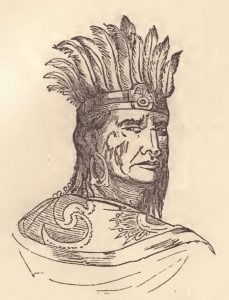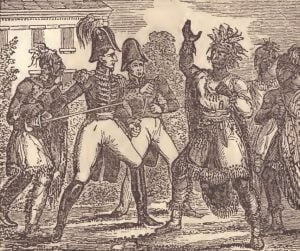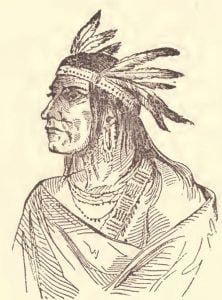British influence and the exertions of two remarkable Indians were the causes of the next important war between the Americans and their western neighbors. The two Indians were Tecumseh, a Shawnese chief, and his brother, the Prophet, Oliwachica. These men commenced their intrigues in 1806. Their object was the same which had been aimed at by Philip of Mount Hope, Pontiac, and other great chiefs the union of the different Indian tribes for the expulsion or extermination of the whites. But Philip’s schemes were trifling compared with those of Tecumseh and his brother. They wished to unite all the Indian tribes of the west, from the Creeks to the Ottawas, and hoped to drive the whites entirely from the valley of Mississippi. To effect this vast object, Tecumseh and the Prophet who was, perhaps, the tool of his great brother, traversed the whole frontiers, made stirring appeals to the prejudices of the different tribes, and made use of all the arts of persuasion and diplomacy, in which they were skilled.

The two brothers, born at the same birth, differed widely in character, but were well fitted to act together in such an enterprise. The Indian name of the Prophet signified “a door opened” in allusion to the way of deliverance he was expected to point out to the red men. The name of Tecumseh, or Tecumthé, as it is sometimes written, signified “a panther crouching.” Tecumseh possessed the daring, active, enthusiastic mind, necessary for forming great plans, and carrying them into execution. He was an able military commander, a skillful negotiator, and possessed that dignity of temper and deportment which secures respect. Well skilled in the springs of human action, he was able to take advantage of the weaknesses of others, and mould them to his purposes. His abilities were stained by a cruel temper, and it is said that he asked no quarters and gave none.
The Prophet had none of the manly qualities of his brother. He is described as being an indifferent warrior and hunter, and crafty, cruel, cowardly, and sensual. He extorted a living from the Indians through the influence of superstition; and circumstances gave him a vast control over their minds. Tecumseh had obtained such a mastery over his brother, that when in council together, the latter never spoke although, as an orator, he was more persuasive than his brother.
Taking advantage of a belief among the Shawanese, that then tribe was destined to restore the dominions of the red men, the Prophet commenced a series of incantations, and from time to time communicated tho result to the credulous Indians. He prophesied the speedy downfall of the power of the whites, and the resumption by the Indians of the customs of their ancestors. To affect this, they were advised to abstain from all intercourse with the whites, and from using any article manufactured by them. The result of the operations of the brothers was the Tippecanoe war of 1812.
When the treaty of Fort Wayne took place, Tecumseh was absent, and on his return, he threatened with death some of tho chiefs who had signed it. Hereupon, Governor Harrison dispatched a message to inquire the cause of his dissatisfaction with the treaty, and inviting him to come to Vincennes and exhibit his pretensions;, assuring him that if they were valid, the land acquired by the treaty should be given up or ample compensation made for it.
Tecumseh accepted the invitation, but treacherously brought with him four hundred armed warriors, instead of thirty, as directed. At the council, he claimed for all the Indians of the country, a common right to all the lands in it; denied the right of any tribe to sell any portion of it without the consent of all, and pronounced the treaty of Fort Wayne null and void. Harrison replied, that when the whites came to this continent, they found the Miamis in occupation of all the country of the Wabash, at which time the Shawanese dwelt in Georgia, from whence they were driven by the Creeks; that the Miamis had consulted their own interest, as they had a right to do, in selling their own lands on terms satisfactory to themselves; and that the Shawanese had no right to come from a distant country, and undertake to control the Miamis in the disposition of their own property. Scarcely were these words interpreted, when Tecumseh fiercely exclaimed, “It is false!” and giving his signal to his warriors, they sprang to their feet and raised their weapons, while Tecumseh continued to address the Indians in a loud voice and with violent gestures. At this critical moment, the courage and decision of Harrison prevented a scene of bloodshed and horror. He rose immediately and drew his sword; but, restraining his guards, he calmly, but authoritatively, told Tecumseh, that “he was a bad man, that he would have no further talk with him; and that he must return to his camp and take his departure from the settlements immediately;” and with that the council was dissolved; and Tecumseh and his warriors, awed by the courage and decision of Harrison, withdrew in silence.
The next morning, Tecumseh, perceiving that he had to deal with a man as vigilant and bold as himself, apologized for the affront which he had offered, and requested another conference. In the second council he behaved with greater moderation, and told the governor, that white men (British agents, undoubtedly,) had advised him to do as he had done, and that he was determined to maintain the old boundary. This the governor said he would report to the president: and the council ended. Governor Harrison then went to Tecumseh’s camp, attended only by an interpreter. He was cordially received but the chief would not recede from his demands; as he was not yet ready to commence hostilities, the matter vested here for a while.

In the latter part of the year 1811, the confederated Indians began to ravage the frontiers; and the government found it necessary to take immediate measures for the protection of its citizens. For this purpose, a small force of regulars and militia was assembled at Vincennes, and placed under the command of William Henry Harrison, governor of the Indiana territory. Harrison was instructed to march to the Prophet’s town, and demand a restoration of the property which had been carried off by his partisans; and he was to obtain redress by force, if necessary.
Accordingly, he marched into the enemy’s country, and on the evening of the 5th of November, encamped within nine miles of the Prophet’s town. The next morning he resumed his march, but discovered no Indians until he had arrived within six miles of the town. Parties of Indians were then frequently seen, but all efforts to open a communication with them were vain. When Harrison came within two miles of the town, the path descended a steep hill, at the bottom of which was a small creek running through a wet prairie; and beyond this a level plain, covered with oak timber, and without under wood. As this was a situation, in which the Indians might attack with advantage, Harrison proceeded with caution, but he met no interruption, and arrived safely before the Indian town. Another attempt was made at negotiation, but the Indians would not listen to it, and Harrison drew up his troops in order of battle. Then three ambassadors came from the Prophet, and after some consideration, it was resolved that no hostilities should take place until the next morning, when a conference should be held with the chiefs, and terms of peace settled.
The army now bivouacked on an elevated plain northwest of the village. To guard against a night attack, the order of encampment was to be the order of the battle. The infantry, in two columns, occupied the front and rear, separated on the left one hundred and eighty yards, and on the right, about one-half that distance. The left flank was covered by two hundred and fifty mounted riflemen, commanded by Major General Wells, of Kentucky; and the right flank by Spencer’s troop of mounted riflemen, numbering eighty men. The front line was composed of one battalion of the fourth regiment of United States infantry, under the command of Major Floyd, flanked on the right by two companies of militia, and on the left by one. The rear line was formed of another battalion of the fourth United States infantry, under Colonel Baer, flanked by four companies of militia, under Lieutenant-colonel Decker. Two troops of dragons, sixty strong, took post in the rear of the left flank, and another, in the rear of the front line. The order was given to the army in the event of a night attack, that each corps should maintain its ground at all hazards, till relieved.
On the morning of the 7th of November, 1811, just before reveille, an attack commenced on the left flank, and the piquets were driven in. The yell of the Indians, who had violated the armistice, was the first notice the army had of their proximity. Nothing but the precaution of encamping in the order of battle, and the firmness of the officers in preventing the usual effects of surprise, saved the whole force from a disastrous defeat. The storm was first felt by Captain Barton’s regulars, and Captain Geiger’s mounted riflemen. Some Indians forced themselves through the line, and penetrated into the encampment, where they were killed. The companies attacked were reinforced with all possible speed. A heavy fire then poured in on the companies on the left of the front. A gallant charge by the cavalry from the rear of the front line, under Major Bevies, was made for the purpose of breaking the Indians, who appeared in great force among some trees, a few yards distant, in front. The cavalry were driven back, and the major received a mortal wound. Captain Snelling’s company then charged, with fixed bayonets, and the enemy were dislodged. The fire of the enemy was now very heavy upon every part of the lines. Several valuable officers fell, but the men were not daunted. As day approached, Major Wells, after reconnoitering the position of the enemy on the left, charged and broke them. At this moment, a small detachment from the cavalry dashed furiously upon the retreating Indians and precipitated them into the marsh. At the same time, the enemy were charged on the right, and pursued as far as the ground would admit. Driven from all their positions, the Indians dispersed in every direction. So severely were they handled in the retreat that they left many of their killed and wounded on the field with them, an evidence of positive defeat. The number of the enemy killed and wounded in battle, was estimated at one hundred and fifty. The loss of the army of Harrison was very severe, both in officers and men. One aid-de-camp, one captain, two subalterns, one Sergeant, two corporals, and thirty privates were killed, and two lieutenant-colonels, one adjutant, one assistant surgeon, two captains, three subalterns, nine Sergeants, five corporals, one musician, and one hundred and two privates wounded, besides one major and two captains mortally.

Tecumseh was not engaged in this battle, being on an excursion to some of the southern tribes. During the contest, the Prophet sat securely on an adjacent eminence singing a war song. He had told his followers that the Great Spirit would render the army of the Americans unsuccessful, and that their bullets would not hurt the Indians, who would have light while the enemy would be involved in darkness. Being told that his men were falling, he ordered them to fight on, and began to sing louder.
The soldiers throughout displayed the most fearless conduct, and thus were enabled to resist one of the most furious assaults ever made by the Indians. Major Davies fell early in the action, greatly lamented by all his associates. He held the first standing in Kentucky as a lawyer and orator, and in the field, he was one of the bravest of the brave. The legislature of Kentucky wore mourning for thirty days, in testimony of their regret for the loss of Davies and others belonging to that state.
After laying waste the Indian settlement, from which the defeated ones were obliged to fly, Governor Harrison returned with his forces to the settled country. The Prophet was immediately abandoned by his followers, who had seen the falsity of his predictions. His life was even endangered by the sudden reaction of those whom he had so successfully deluded. However, he added but one more to the world’s long list of false prophets. After their terrible defeat, the Indians seemed inclined to peace, and in a short time, they appeared as suppliants for that which they had refused to grant.
